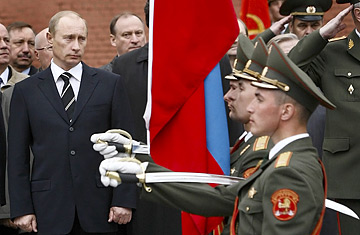
Russian President Vladimir Putin lays a wreath at the tomb of the Unknown Soldier beside the Kremlin in Moscow, May 8, 2007, one day before the country marks the 62nd Anniversary of its Victory in World War II.
It is the most sacred national day in Russia because victory over Nazism was a matter of national survival for the numerous peoples of the Soviet Union, as well as many others decreed "inferior" by the Nazis.
And it is the most bitter because Soviet policies had strengthened Hitler in the first place, allowing him to grab lands that were liberated only after four years of desperate combat, which cost the lives of some 27 million Soviet citizens. Historians still argue why the first months of war proved so disastrous to Soviet forces and how they recovered to strike back. The answer is that not many were all that eager to fight for the Stalin dictatorship, as the Germans invaded. But the horror and terror of Nazism, unleashed on the conquered territories, forced the people to fight back for survival and turned the conflict into the Great Patriotic War, Stalin or not.
Maybe that was the reason why, for the first 20 years after 1945, the Soviet authorities refrained from emphasizing the May 9 anniversary, lest unpleasant memories be stirred up. Only in 1965 was the country first given a day off for V-Day. That may have been because the Soviet Union, now approaching its 50th anniversary, had little else besides the defeat of Hitler to be proud of. So, the official drums started beating up the Single-Handed-Soviet-Victory-Over-Fascism theme. The worse things went in this country, the more graphic the war stories dominating Soviet TV and cinema screens each spring, the state sparing no effort to sell its tale of how "the people rallied around the Party during the Hitlerite invasion and saved the world." The point, of course, was that the people had to continue rallying around the Party, to resist the machinations of an external enemy and its internal agents.
It is no surprise, then, that this pattern is now being repeated under President Vladimir Putin, as Moscow's relations with the West sour and the screws are tightened domestically. Opposition parties are banned, and rallies are brutally broken up by the police. NGOs get shut down, while the state launches criminal probes into their leaders. The cowed media's controls grow ever harsher. And, just as 42 years ago, the Kremlin propaganda invokes the specter of an external enemy and its internal agents threatening Mother Russia. The continuing hysteria against "the desecration" of the Soviet memorial in Estonia (which in reality has been moved to a military cemetery and reopened with full military and state honors) now extends into warning signals to Poland which plans to move several hundred Communist-era memorials, including Soviet ones. Indeed, the USSR lost 640,000 soldiers liberating Poland, and their memory must forever be respected. But they died liberating Poland because Stalin and Hitler had carved up that country in 1939. A real tragedy of the war was that Soviet soldiers "boldly entered foreign capitals and came back to their own one in fear," to quote the Nobel Prize Winner poet Josef Brodsky. They destroyed Nazism, but, in a bitter twist of history, their heroism in defense of the Motherland also shored up another despicable tyranny. And having liberated the countries of Eastern Europe, they installed a new occupation.
Rather than remember and reconcile, the Putin regime doesn't miss a chance to abuse the sacred May 9 anniversary as a part of a wider campaign to fan nationalist hysteria in Russia ahead of December's parliamentary elections, and the Presidential poll scheduled for next March. Just as in Soviet times, there's nothing like the specter of an external enemy, either to make the people accept that they don't change horses in midstream and let Putin stay — or to pave the way for someone way harsher than Putin. A strong hand to keep the country together. Just what the people need to have Victory, when confronted with an "external enemy."
